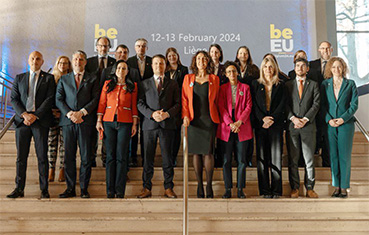The Congress Palace in the city of Liège (Belgium) hosted a new European Social Economy Meeting on February 12th and 13th, organized by the 2024 Belgian Presidency of the EU Council. The three Belgian regions of Wallonia, Flanders and Brussels joined forces to present a broad overview and offer participants the best possible experience. The event was co-constructed with the Belgian regional administrations, stakeholders, and experts, including CIRIEC International and CIRIEC Belgium, at the request of the Walloon government.
Representative organizations of the social economy, political figures, institutional leaders, university professors, scientists, and other stakeholders discussed at the conference the role of the social economy in inclusive, green, and digital transitions, with the aim of building a more social and sustainable Europe.
The event was held under the title ‘The social economy at the core of transitions’ and followed on from the European Conference held last November in San Sebastián, organized by the Ministry of Labour and Social Economy of the Government of Spain.
Over two days, the Liège event hosted three plenary sessions dedicated to each of the transitions; six best practice workshops and four round tables on public strategies and policies, state aid, mainstreaming the social economy and access to finance.
In addition, enterprise visits, networking spaces, and an area called the ‘Social Economy Village’ were organized, where stands, videos, and animations were used to showcase some of the achievements and initiatives of social economy organizations and enterprises.
The social economy, a key pillar of the EU’s new agenda
Among those attending the event were the President of the European Economic and Social Committee (EESC), Oliver Röpke, and the Vice-President of the Walloon Government, Minister for Employment, Training, Health, Social Action and the Social Economy, Equal Opportunities and Women’s Rights (Belgium), Christie Morreale. All of them advocated for the social economy to be a crucial pillar in the new European agenda.
Amparo Merino, Secretary of State for Social Economy of the Government of Spain, also stressed that the current European legislature, which is drawing to a close, ” has been a legislature for winning rights, not reducing them, and this is particularly evident in the field of the social economy.” Therefore, she insisted on the relevance of the next European Commission maintaining the Social Economy and its European Action Plan as one of its priorities.
Sarah de Heusch, Director of Social Economy Europe, referred to the digital transition, encouraging social economy enterprises to delve into this path. She also mentioned that the social economy is an important actor in addressing the digital divide and shaping a democratic digital space, with a focus on digital common goods.
The Social Economy at the heart of policies
Juan Antonio Pedreño, President of Social Economy Europe, also highly valued this meeting and its impact, as the conference brought together around twenty countries that have shown a strong commitment to the model. “All these countries place the social economy at the core of their policies, identify the model at the heart of their economy, and declare their intention to develop policies and implement the EU Council Recommendation for the Social Economy, which was recently approved,” explained Juan Antonio Pedreño, who added: “This will allow legal frameworks, laws, and strategies for promoting the social economy to be developed in the various countries within two years.”
Juan Antonio Pedreño also emphasized that the Luxembourg Committee has approved internal regulations to ensure the continuity of the Committee as a driver of public policies in the social economy. The same Committee has unanimously approved that in the next EU legislature, there should be a commissioner responsible for the social economy.
Liège Roadmap
The Meeting concluded on February 13th with the signing of the ‘Liège Roadmap for Social Economy in the European Union,’ which expands on last year’s San Sebastián Manifesto with new commitments from governments to promote the sector in the EU.
Among the commitments are the promotion, creation, and development of curricula and training centers dedicated to social economy and social entrepreneurship, as well as the creation and development of master’s programs, chairs, and research-action programs in social economy in universities.
Governments also undertake to stimulate the creation of statistical tools adapted to the social economy, at local, regional, national, and European levels, in order to support the collection of data and studies that specifically detailing the reality of the social economy and provide a more accurate picture of its ecosystem and its impact.







